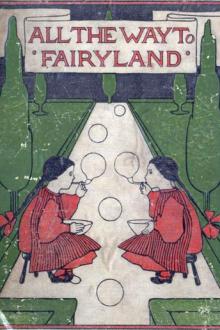A Woman's War by Warwick Deeping (top romance novels txt) 📕

- Author: Warwick Deeping
- Performer: -
Book online «A Woman's War by Warwick Deeping (top romance novels txt) 📕». Author Warwick Deeping
He drew out the week’s money when they had talked
for a while, and handed the three sovereigns to her, keeping only the three shillings for himself. Catherine wore
the key of their cashbox tied to a piece of ribbon round
her neck. It was Murchison who had insisted on this
precaution. Every week he gave the money to her, and
saw her lock it in the cashbox on her desk.
“Shall I still keep the key, dear?”
“Keep it.”
“Yes,” and she colored like a girl, “you know that I
trust you.”
“I know it, but I have sworn to myself, dear, to risk
nothing.”
She rose slowly and put the money away, glad in her
heart of his quiet and determined strength.
“I understand—”
“That I mean to crush this curse now once and
forever.”
Murchison finished his pipe, and Catherine put her
work away. The front door was locked, the gas turned
out. Husband and wife went up the stairs together,
Catherine carrying the lighted candle. She opened a
door leading from the narrow landing, and they went in,
hand in hand, to look at their two children who were
asleep.
A wistful smile hovered about Murchison ‘s mouth.
“Poor little beggars, they don’t see much of me!”
He was thinking of the past and of the future. Indeed,
he thought the same thoughts nightly as he looked at the
two heads upon the pillows.
“Gwen is looking better again.”
“Is she?” and he sighed.
“We had quite a long walk to-day before it began to
rain.”
They spoke in undertones, Murchison leaning over
Gwen’s little bed. He looked at her very lovingly, as
though wishing to feel her small arms about his neck.
“Goodnight, little one. Goodnight, Mischief Jack,”
and he turned to his wife with the air of a man repeating
a solemn and nightly prayer.
FAILURE is bitter enough in itself to a man of energy
and strength of purpose, but more bitter still are
the humiliations and the sufferings that failure may impose on those he loves.
Reputation, resources, his very home, had been swallowed up, but in Murchison there was that dogged northern spirit, that stubborn uplift against odds, that is at its
strongest when confronted with defeat. Like a man
brought to the edge of a black cliff at night, he had looked
down grimly into the depths, depths that waited not for
him alone, but for the innocent children who held his
hands.
As a cheap assistant in a colliery town, James Murchison had joined issue with his own unfitness for the ordeal
of life. A tight-mouthed and rather silent man, he had
entered upon the rebuilding of his selfrespect with the
dogged patience of a Titan. The little, red brick villa,
with the dirty piece of waste land in front and the black
canal behind, might have suggested no stage for heroic
drama to the casual eyes of Murchison’s neighbors. The
big, brownfaced man stalked to and fro to work, quiet
and unobtrusive, a figure that was soon familiar to most
of the middle-class people who lived on either side. He
seemed one of those many mortals who move through
life without a history, an ant in an ant world, busy, monotonously busy, earning his paltry pounds a week, without
glamour, and without fame.
Man suffers most in seeing those dear to him in suffering, and the tragic tones of life are caught from the lips
of those he loves. The wounds of a wife or of a child are
open in the heart of the husband or father. Remorse or
self-accusation, if there be cause for such a feeling, is as
the vinegar on the sponge to the man crucified by his own
sin. One has but to come in contact with the material
side of civilization to discover how desperately sordid this
twentieth-century life can be. How great the contrast
was between Roxton lying amid its woods and meadows,
and the dismal colliery town, Murchison, as a father,
realized too soon. The one smelled of the fresh earth,
primal and invigorating; the other of soap-works, soot,
cabbage-water, and rancid oil. In Roxton the mortality
was low; in the colliery town hundreds of infants died
yearly before they were four weeks old.
Such realism, the vivid heritage of thousands, might
well make a man go grimly through life, the burden of
care very heavy on his shoulders.
To watch a wife’s face fade, despite her courage, poverty and sorrow bringing weariness to the serenest eyes.
To know that drudgery burdens the dear life of the
home.
To watch the lapsing of a child from sheer health
into sickness, the beautiful aliveness vanishing, the bloom
marred like the bloom on handled fruit.
The consciousness of dependence and obligation, the
receiving of brusque instructions from a man of cheap
and vulgar fibre.
Sordid surroundings, sordid neighbors, an utter dearth
of friends.
Work, eternal work, day in, day out; no Sabbath rest,
no time for home life, no money to give joy to those most
dear.
A vivid ghost past following, like a shadow.
A dim and unflattering future before the eyes, a future
darkened by the prophetic dread of leaving wife and
children alone in a selfish world.
Such were the realities that filled James Murchison’s
sphere of consciousness, realities that were responsible
for many a sleepless night.
It was the afternoon of a February day when Murchison stopped before the theatre in Wilton High Street, for
the colliery town delighted in melodrama, and pulling
out a pigskin purse, examined the contents with critical
consideration. He had saved a few shillings by stinting
himself in tobacco, and in his daily lunch at a cheap
eating - house near Dr. Tugler’s surgery. The pantomime “Puss in Boots,” was still running at the theatre,
and at the box-office Murchison bought four tickets for
the upper circle.
In the old days the children had gone up yearly to
Drury Lane, and Master Jack had been making many
allusions to the gaudy “posters” covering a hoarding
near the row of red brick villas. More than once the
boy’s thoughtless words had hurt the father’s heart. It
was chiefly of Gwen that Murchison thought as he thrust
the envelope with its yellow slips into his breastpocket.
At Clovelly, Catherine, her sleeves turned up, stood in
the little back kitchen making a suet - pudding. The
Murchisons had dispensed with a servant because of the
expense, for their income had practically no margin, and
money had to be scraped together to pay the yearly dividend on the husband’s life-insurance. Catherine’s mother,
a somewhat stern, pious, and bedridden old lady, living
in a respectable south-coast town, allowed her daughter a
small sum each year. Mrs. Pentherby was the possessor
of a comfortable income, but suffered from a meanness
of mind and a severity of prejudice that had made her
rather merciless to Murchison in the hour of his misfortune. Such money as she sent was to be spent “solely on the children.” Catherine’s face had often reddened
over the contents of her mother’s drastic and didactic
letters. Her love and her loyalty were hurt by the old
lady’s blunt and Puritanical advice. As for James Murchison, he had too much pride to ever dream of touching
Mrs. Pentherby’s “ear-marked” donations to his children.
On several occasions a five-pound note had reached
Clovelly anonymously from another quarter. Murchison had suspected Porteus Carmagee of this noiseless
generosity, but he had been unable to discover whence
the money came. The little lawyer of Lombard Street
alone knew how the phenomenal damages accorded to
Mrs. Baxter by a sentimental jury had swept away all
Murchison’s savings, and even the money realized by
the sale of his furniture and his car. Yet these five-pound
notes were always placed in Catherine’s hands, to be deposited in the post-office savings-bank in Gwendolen
Murchison’s name. At Christmas a huge hamper had
reached them from Roxton, a hamper whose bulk had
symbolized the abundant kindness of Miss Carmagee ‘s
virgin heart. Friends in adversity are friends worthy of
honor, and Miss Carmagee, good woman, had packed the
hamper with her own fat and generous hands.
Catherine, her fore-arms white with flour, stood in the
little back kitchen, tying a piece of cloth over the puddingbowl before sinking it in the steaming saucepan on the
fire. The winter day was drawing towards twilight.
Mists hung over the black canal. Through the windows
could be seen the zinc roofs of a number of storage sheds
attached to the buildings of a steam-mill.
In the front parlor the horse-hair sofa had been drawn
beneath the window, and Gwen, her golden head on a
faded blue cushion, lay, trying a new frock on a great
wax doll. The child’s eyes looked big and strange in her
pale face, and the blue veins showed through the pearly
skin. Apathy in a child is pathetic in its unnaturalness,
the more so when the sparkle of health has but lately left
the eager eyes. Gwen had whitened like a plant deprived
of life. Her black-socked legs were no longer brown and
chubby. She had the unanimated and drooping look of
a child languid under the spell of some insidious disease.
The garden gate closed with a clash as Master Jack
came crunching up the gravel-path, swinging his ragged
school-books at the end of a strap. He grimaced at
Gwen, and rang the bell with the cheerful verve of youth,
for John Murchison was a sturdy ragamuffin, capable of
adapting himself to changed surroundings. The young
male is a creature of mental resilience and resource.
Toys were fewer, puddings plainer, parties unknown.
But a boy can find treasures in a rubbish heap and mystery in the dirty waters of a canal.
Master Jack’s return from school was usually a noisy
incident. He appeared loud and emphatic, an infallible
autocrat of eight.
“I say I’m hungry.”
Bang went the books into a corner of the hall. For
the hundredth time Catherine reproved her son, and insisted on Master Jack’s “primers” being put in order on
the proper shelf. The boy, much under compulsion,
stooped for those battered symbols of civilization, disclosing in the act a disastrous rent in his blue serge
knickers.
“Jack, dear, what have you been doing to your clothes?”
“What clothes, mother?”
The boy’s innocent yet subtle obtuseness did not save
him from further catechisation.
“I only mended your knickers yesterday, Jack, and
they were new last month.”
“My knickers, mother!”
“What have you been doing?”
Master Jack passed a hypocritical hand over a certain
region.
“Lor!”
“Don’t say ‘lor,’ dear.”
“Well, I never! I was only climbin’with Bert Smith.”
“You don’t think, Jack, that clothes cost money.”
It was perfectly plain that no such thought ever entered Jack Murchison’s head. Children are serenely insensible to the worries of their elders, and, moreover,
Master Jack had at the moment a grievance of his
own.
“Bert Smith’s going to the pantomime,” and he pushed
past his mother into the front room, swinging his books.
“Jack, be careful!”
“Why don’t we go to the pantomime? It’s a beastly
shame!”
Catherine’s lips quivered almost imperceptibly. The
blatant self-assertiveness of boyhood hurt her, as the
thoughtless grumblings of a child must often hurt a
mother.
“Put those books down, dear, and go and change your
knickers.”
Jack obeyed, if swinging the books into a corner could
be called obedience. Catherine restrained a gesture of
impatience. Gwen, lying on the sofa, winced at the clatter as though morbidly sensitive





Comments (0)